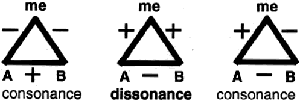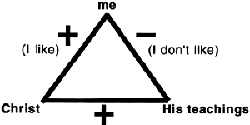 In the triangle at the left, A & B are friends (positive relationship), and I dislike both (negative relationships).
In the triangle at the left, A & B are friends (positive relationship), and I dislike both (negative relationships). This makes sense. It does not cause dissonance.
In the right triangle, A & B dislike each other (negative) and I only like one of them.
This also makes sense (because presumably A & I both dislike the same thing in B).
But, if I like both A & B, yet they dislike each other (center), my brain seeks an explanation for this contradiction. Both of these people are my friends, and yet they dislike each other. I must unite them, or I may be forced to side with one against the other.
Now let's look at the teachings of Christ. If I say that I like Christ, and if he believes his own teachings, then it makes sense that I should accept his teachings too. If not, then cognitive dissonance occurs.I could simply drop Christ and find a leader whose teachings I do agree with. But in our society, that isn't so easy.

In order to silence the dissonance in my brain, I must either (a) reconcile myself with Christ's teachings (i.e. change the minus to a plus); or (b) separate Christ from his teachings (i.e. change the plus at the bottom to a minus).
Very few professing Christians are willing to alter their actions to conform with Christ's teachings. They will profess to accept his teachings in some vague way, but when they are pushed on the subject, they will almost always opt for a strategy which separates Christ from his teachings.
Those who say we can accept the name of Christ, the divinity of Christ, the cross of Christ, or the person of Christ without accepting his teachings are using this plan, as are those who argue that Christ didn't mean the things he said or that he was only speaking metaphorically.In either case, the person has first rejected Christ's teachings, and then devised a mental strategy to justify (or bring cognitive consonance out of) the rejection. And the strategy always separates Christ from his teachings, to the point where he and his teachings are in opposition to one another.
The person who is doing this is trying to ease his or her conscience, and to silence the cognitive dissonance. But, because the brain is not so easily deceived, dissonance continues, especially after we point out the contradictions. Too much cognitive dissonance can lead to mental illness.
The role of the clergy in Western Society is to silence this dissonance with soothing music, sophisticated arguments, and stirring sermons.It reminds us of an Andy Capp cartoon. Andy goes to a psychiatrist to say that he has been feeling guilty about how much he drinks. The psychiatrist says, "I think we can help you stop drinking." Andy reacts by leaning over the desk, grabbing the psychiatrist by the tie, and saying, "I don't want to stop drinking, you twit! I just want to stop feeling guilty!"
 The laity doesn't want to follow Christ. But they do want someone to make them stop feeling guilty for rejecting His teachings. And that is seen as the church's job.
The laity doesn't want to follow Christ. But they do want someone to make them stop feeling guilty for rejecting His teachings. And that is seen as the church's job.
Because we teach people to obey Christ, we are accused of this one heresy by virtually every denomination in the world!
The churches are, quite seriously, incapable of clear thought in this area of Christian faith. If pushed, they will respond irrationally.
Of course these same churches know that they should believe in something. So they teach obedience to others besides Christ (parents, pastors, and governments), and hard work for money rather than for love. They campaign against drugs, abortion, and other social evils. They urge people to pray, attend meetings, read religious books, give to the building fund, and seek religious experiences. Crusades are launched to evangelise the world, to unite denominations, and to produce new translations of the Bible.
This frenzy of religious activity is aimed at distracting from the issue of obedience to Christ. But it doesn't completely stop the dissonance. We know, because when we teach obedience to Christ, the backlash continues.
 Unless professing Christians are prepared to face up to the teachings of Christ, they are going to become more and more irrational, and more and more insane.
Unless professing Christians are prepared to face up to the teachings of Christ, they are going to become more and more irrational, and more and more insane.
The spirit that cried out for the crucifixion of Christ is even today crying out for authorities to rid the earth of what we are teaching about obedience to Christ. The church is headed for a mental breakdown of epidemic proportions. And the only cure is honest and deep repentance.
In the right triangle, A & B dislike each other (negative) and I only like one of them.
This also makes sense (because presumably A & I both dislike the same thing in B).
But, if I like both A & B, yet they dislike each other (center), my brain seeks an explanation for this contradiction. Both of these people are my friends, and yet they dislike each other. I must unite them, or I may be forced to side with one against the other.
Now let's look at the teachings of Christ. If I say that I like Christ, and if he believes his own teachings, then it makes sense that I should accept his teachings too. If not, then cognitive dissonance occurs.I could simply drop Christ and find a leader whose teachings I do agree with. But in our society, that isn't so easy.

In order to silence the dissonance in my brain, I must either (a) reconcile myself with Christ's teachings (i.e. change the minus to a plus); or (b) separate Christ from his teachings (i.e. change the plus at the bottom to a minus).
Very few professing Christians are willing to alter their actions to conform with Christ's teachings. They will profess to accept his teachings in some vague way, but when they are pushed on the subject, they will almost always opt for a strategy which separates Christ from his teachings.
Those who say we can accept the name of Christ, the divinity of Christ, the cross of Christ, or the person of Christ without accepting his teachings are using this plan, as are those who argue that Christ didn't mean the things he said or that he was only speaking metaphorically.In either case, the person has first rejected Christ's teachings, and then devised a mental strategy to justify (or bring cognitive consonance out of) the rejection. And the strategy always separates Christ from his teachings, to the point where he and his teachings are in opposition to one another.
The person who is doing this is trying to ease his or her conscience, and to silence the cognitive dissonance. But, because the brain is not so easily deceived, dissonance continues, especially after we point out the contradictions. Too much cognitive dissonance can lead to mental illness.
The role of the clergy in Western Society is to silence this dissonance with soothing music, sophisticated arguments, and stirring sermons.It reminds us of an Andy Capp cartoon. Andy goes to a psychiatrist to say that he has been feeling guilty about how much he drinks. The psychiatrist says, "I think we can help you stop drinking." Andy reacts by leaning over the desk, grabbing the psychiatrist by the tie, and saying, "I don't want to stop drinking, you twit! I just want to stop feeling guilty!"
 The laity doesn't want to follow Christ. But they do want someone to make them stop feeling guilty for rejecting His teachings. And that is seen as the church's job.
The laity doesn't want to follow Christ. But they do want someone to make them stop feeling guilty for rejecting His teachings. And that is seen as the church's job.Because we teach people to obey Christ, we are accused of this one heresy by virtually every denomination in the world!
The churches are, quite seriously, incapable of clear thought in this area of Christian faith. If pushed, they will respond irrationally.
Of course these same churches know that they should believe in something. So they teach obedience to others besides Christ (parents, pastors, and governments), and hard work for money rather than for love. They campaign against drugs, abortion, and other social evils. They urge people to pray, attend meetings, read religious books, give to the building fund, and seek religious experiences. Crusades are launched to evangelise the world, to unite denominations, and to produce new translations of the Bible.
This frenzy of religious activity is aimed at distracting from the issue of obedience to Christ. But it doesn't completely stop the dissonance. We know, because when we teach obedience to Christ, the backlash continues.
 Unless professing Christians are prepared to face up to the teachings of Christ, they are going to become more and more irrational, and more and more insane.
Unless professing Christians are prepared to face up to the teachings of Christ, they are going to become more and more irrational, and more and more insane. The spirit that cried out for the crucifixion of Christ is even today crying out for authorities to rid the earth of what we are teaching about obedience to Christ. The church is headed for a mental breakdown of epidemic proportions. And the only cure is honest and deep repentance.

















